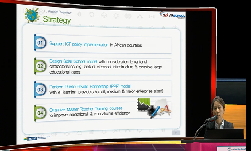The purpose of this study was to understand the relationship between individual risk factors, school environmental stressors/supports, and identity development and later academic and psychological functioning of African American adolescents. The mode...
http://chineseinput.net/에서 pinyin(병음)방식으로 중국어를 변환할 수 있습니다.
변환된 중국어를 복사하여 사용하시면 됩니다.
- 中文 을 입력하시려면 zhongwen을 입력하시고 space를누르시면됩니다.
- 北京 을 입력하시려면 beijing을 입력하시고 space를 누르시면 됩니다.
The academic and psychological functioning of African American adolescents: What matters most?
한글로보기https://www.riss.kr/link?id=T12875709
- 저자
-
발행사항
[S.l.]: Michigan State University 2011
-
학위수여대학
Michigan State University School Psychology
-
수여연도
2011
-
작성언어
영어
- 주제어
-
학위
Ph.D.
-
페이지수
122 p.
-
지도교수/심사위원
Adviser: Evelyn R. Oka.
-
0
상세조회 -
0
다운로드
소속기관이 구독 중이 아닌 경우 오후 4시부터 익일 오전 9시까지 원문보기가 가능합니다.
부가정보
다국어 초록 (Multilingual Abstract)
Initial data analysis was performed to establish differences in outcome variables between African American and European American students in the sample. The full sample consisted of 1,518 adolescents (16.0% African American and 84.0% European American). Results indicated significant gender and ethnic group differences on measures of ethnic identity and aggressive behaviors, and significant gender differences in depression and academic engagement. In a sub-sample of African-American adolescents (n=243), the racial/ethnic context did not significantly predict later academic engagement, depression, or aggressive behaviors, suggesting that being in a school with a homogenous African American population or European American population was not correlated with engagement or psychological functioning. Findings did suggest, however, that personal characteristics such as gender and age, predicted future outcomes. Students' perceptions of teacher support, however, had the greatest effect on academic engagement and aggression. Students who perceived greater support from their teachers engaged more in school and in fewer aggressive behaviors. Furthermore, results indicated that the development of a positive ethnic identity is important for later academic engagement among this population, particularly for African American males, but it did not mediate the relationship between stressors in the school environment and student outcomes. Continued research is warranted to explore the role of school contextual factors and outcomes for African American adolescents to better support the academic achievement of this population.
The purpose of this study was to understand the relationship between individual risk factors, school environmental stressors/supports, and identity development and later academic and psychological functioning of African American adolescents. The model was developed using a modified version of the Phenomenological Variant of Ecological Systems Theory model. More specifically, this study explored the role of early experiences of teacher support and the school's racial/ethnic context on later academic engagement and psychological outcomes of African American adolescents. The study also investigated how risk factors among this population (e.g., gender and age) and protective factors (e.g., ethnic identity) were related to teacher support and outcomes (e.g. academic engagement, depression, and aggressive behavior).
Initial data analysis was performed to establish differences in outcome variables between African American and European American students in the sample. The full sample consisted of 1,518 adolescents (16.0% African American and 84.0% European American). Results indicated significant gender and ethnic group differences on measures of ethnic identity and aggressive behaviors, and significant gender differences in depression and academic engagement. In a sub-sample of African-American adolescents (n=243), the racial/ethnic context did not significantly predict later academic engagement, depression, or aggressive behaviors, suggesting that being in a school with a homogenous African American population or European American population was not correlated with engagement or psychological functioning. Findings did suggest, however, that personal characteristics such as gender and age, predicted future outcomes. Students' perceptions of teacher support, however, had the greatest effect on academic engagement and aggression. Students who perceived greater support from their teachers engaged more in school and in fewer aggressive behaviors. Furthermore, results indicated that the development of a positive ethnic identity is important for later academic engagement among this population, particularly for African American males, but it did not mediate the relationship between stressors in the school environment and student outcomes. Continued research is warranted to explore the role of school contextual factors and outcomes for African American adolescents to better support the academic achievement of this population.
분석정보
연관 공개강의(KOCW)
-

Education Policy at the Party Conferences
Teachers TV Teachers TV -

2014 이러닝 국제 콘퍼런스 : What is the Lessons from Education Support Project~
한국교육정보진흥협회 Boseon, Kim -

Early Sex Education: The Debate
Teachers TV Teachers TV -

Alcohol Education: Here's What We Want
Teachers TV Teachers TV -

Personal Finance Education: The Money Quiz
Teachers TV Teachers TV






